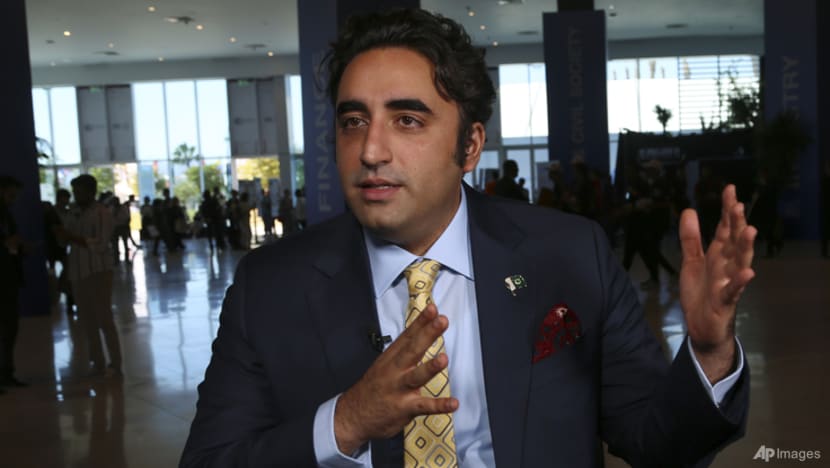'We’re tired of conflict’: Pakistan treads carefully on Ukraine war; hails relationship with China
Pakistan’s Foreign Minister Bilawal Bhutto Zardari said that although he sympathises with Ukraine, Pakistan has its own issues to deal with and does not want to be involved in other conflicts.

Pakistan Foreign Minister Bilawal Bhutto Zardari speaks during an interview at the COP27 United Nations Climate Summit on Nov 9, 2022, in Sharm el-Sheikh, Egypt. (AP Photo/Thomas Hartwell)
SINGAPORE: Pakistan has been steadfast in maintaining its neutral stance on the Russia-Ukraine war, despite the global economic fallout from the conflict increasingly deteriorating its already fragile financial situation.
During an interview with CNA last Friday (Dec 9), Pakistan Foreign Minister Bilawal Bhutto Zardari again sidestepped the question of whether his country would eventually bend to international pressure and take sides.
He said that although he sympathises with Ukraine, Pakistan has its own issues to deal with and does not want to be involved in other conflicts.
“There is too much misery going around in my own neighbourhood for us to be driven to engage with what is of course a devastating situation being carried out in Ukraine,” Mr Bhutto Zardari said.
NEUTRAL STANCE ON UKRAINE WAR
The United Nations General Assembly in October passed its latest resolution on Russia, condemning its annexation of four occupied regions in Ukraine through controversial referendums.
The resolution demanding Russia’s “immediate reversal” was supported by 143 countries and rejected by five. Pakistan, resisting pressure from the United States and its allies, was among 35 states that abstained from the vote.
Pakistan has been largely consistent in abstaining on UN resolutions on Russia, and has avoided criticising Moscow.
“As far as the people of Pakistan are concerned, we are just tired and exhausted of conflict,” said Mr Bhutto Zardari.
“(Pakistan) knows devastation … We're very wary of being drawn into another ‘forever war’. So that is why we're incredibly careful about how we engage with this issue."
The “forever war” refers to the US invasion of Afghanistan in 2001, which lasted for two decades and ended with America’s exit last year.
Pakistan saw a rise in extremism following the US entry into Afghanistan as insurgents fled across their shared border. An increase in violence and an influx of Afghan refugees took a toll on Pakistan’s security and economy.
Mr Bhutto Zardari also griped that the world’s attention shifted too quickly towards Ukraine from Afghanistan.
“I can't tell you how quickly the world's attention shifted. The space for Afghani refugees has been taken up by Ukrainian refugees. The space for humanitarian assistance for Afghanistan has been taken up by humanitarian assistance for Ukraine,” he said.
PAKISTAN’S STANCE ON XINJIANG
Unlike the conflict in Ukraine, Pakistan has taken a position on UN reports of human rights abuses on the Uyghur community in China’s Xinjiang region.
Despite regularly calling for international response against Islamophobia, Pakistan has on numerous occasions reiterated its support for the Chinese government’s treatment of Uyghurs and other Muslim minorities.
Mr Bhutto Zardari echoed previous prime minister Imran Khan’s stance on the issue, telling CNA that Pakistan was among nations that sent representation to China to assess the situation, and found that UN claims of human rights abuses were “taken out of context”.
Such diplomatic visits are organised by China.
“Most claims of human rights abuses against Uyghurs in Xinjiang are highly politicised by (the) West. China is being singled out on the 'naughty list' when it comes to human rights abuses,” he said.
The foreign minister added that he “takes issue with what feels like the targeting of China”, saying reorientation camps and anti-extremism camps have, too, been deployed in Iraq and other nations.
On the question of whether he is satisfied with Beijing’s denials of abuse in the region, Mr Bhutto Zardari said: “I'm pretty satisfied … China knows what's going on in their own territory.”
Mr Bhutto Zardari also said he disagreed with the UN's issuing of human rights reports, saying that countries which have concerns should “not talk about it in the media”, and instead have “frank conversations” in private.
China is Pakistan’s biggest economic beneficiary. It is Pakistan’s main trading partner, and has injected billions of dollars into infrastructure, transport, manufacturing and dozens of other sectors.
Beijing’s most prominent investment project in its South Asian neighbour is the ambitious US$62 billion China-Pakistan Economic Corridor (CPEC).
It is part of Chinese President Xi Jinping's larger Belt and Road Initiative, aimed at linking the southern port of Gwadar to western China, and in the process, creating jobs and business opportunities.
Mr Bhutto Zardari touted Pakistan’s relationship with China as “very comprehensive”, with much economic potential.
“We've seen a commitment to incredible economic opportunity in our engagement with China. For example, with the CPEC, we have seen our communication and energy infrastructure really come up in the last decade,” he said.
“We call ourselves all-weather strategic partners, and we pride ourselves on the history of our relationship with China. There's a lot of economic potential for us to unlock,” he added.















